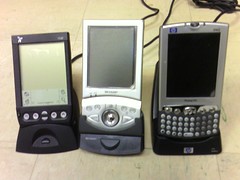From 2000 to I think 2005, I was an avid PDA user. I went through three PDAs, shown here in a group photo:

Ah, so many memories. The Visor on the left was my first PDA, a simple and well designed piece of equipment that I used with a fold-up keyboard to take field notes at Telecorp.
The Zaurus in the middle was an actual handheld PC running Linux; I quickly installed OpenZaurus so that I could perform various tricks, and I also ran Apache, MySQL, and PHP on it. Yes, that is ridiculous. The bottom part slid out to reveal a keyboard. Oh, it also took a CompactFlash card, so I acquired a CF wifi card and did a lot of surfing throughout the house.
The iPaq came at about the same time I switched my Linux laptop for a Macintosh. I had hoped that the iPaq's Windows Mobile operating system would provide a more stable and consistent runtime environment. Wifi was built in.
When the iPaq died, I faced the decision of what PDA to buy. At the top of my list was email and web browsing, which had become necessities. Fortunately, web services had really taken off by then, making SMS a de facto command line for many Internet services. So instead of a PDA, I bought a basic phone with high-speed internet capability. Here it is, two years ago.

It was much smaller and lighter than a PDA, and it allowed basic PDA-like functions. I could set calendar appointments and receive reminders via SMS. I could check email. I could do basic web surfing. I had a set of contacts, of course, which I would laboriously code into the phone. I could even look at (but not edit) my Google Docs and other services. In 2007 I began using Twitter and Facebook, mostly through the phone. In some ways that phone, with its relatively stripped-down interface, was like my beloved Visor. But without the fold-out keyboard accessory. And it began to really enhance my increasingly mobile lifestyle. I could catch up with email and tasks on the bus, for instance, or while walking across campus.
But as time wore on, phones began to incorporate other features such as GPS, and I realized that these other features were going to enhance mobility in significant ways. More on that in a future post.
Others have been comparing the G1 to the iPhone. I won't do that except peripherally. My comparisons will primarily be to my history of phones and PDAs. Look for these to come soon.


